By Pepper Parr
BURLINGTON, ON The first we heard of the problem was when city manager Jeff Fielding casually mentioned at a city council committee meeting a couple of months ago that he suspected the city would experience net negative growth with ICI taxes.
ICI taxes is the tax revenue to city gets from the Industrial, commercial and institutional sector. The ICI sector pays more in taxes on their assessed value than residential properties pay.
In a sentence that means the city brings in more money from ICI properties than it does on housing. Just as important to the city is that they spend less in providing services to the ICI sector than they do to the residential sector.
So – from the city’s perspective building more ICI and less housing is a good thing. More money comes in and less money has to be spent.
And that for Burlington is now a problem. There hasn’t been very much in the way of ICI growth – meaning no big tax dollars coming in. Worse still – we are losing some of the big industrial companies. International Harvester will move to Hamilton shortly. There is no one with plans on the table to put up a large industrial, commercial or institutional structure. – and because the city cannot have a deficit it has to either cut costs or get more from some other source. That other source is YOU – the city will begin charging fees for everything that moves.
The one commercial structure that is well past the drawing boards is getting tied up in red tape – the issue on that one is whether there should be affordable housing in the downtown core.
The city can dip into its reserves – and Burlington has very healthy reserves, but the province requires municipalities to maintain high reserve levels so those fat piggy banks can only be looked at enviously. If the reserves fall too low – the city’s cost of borrowing rises.
That “other” source is taxes on residential housing or increases in service fees. And they can only go so far with fee increases – so guess where the ax falls? On the necks of the residential property owners and in cutbacks in services.
In the 2008/09 taxation year the commercial industrial growth was 1.9% over the previous year. In the 2009/2010 tax year the growth was 1.73% over the previous year. In 2010/11 the growth over the previous year was 1.99%. In 2011/2012 the growth over the previous year was .46% and in 2012.2013 the growth was .17%.
 The trend is not good and as Fielding told council, the city appears to be moving to a negative rate of growth – a situation that is not sustainable.
The trend is not good and as Fielding told council, the city appears to be moving to a negative rate of growth – a situation that is not sustainable.
When this issue came up at a Development and Infrastructure meeting earlier this week – there was no sense of alarm – they yammered away about a private tree bylaw.
The data the treasury department has shown that people who live in Burlington have jobs – but those jobs are not in Burlington. They travel to Oakville, Hamilton, Mississauga and Toronto. And they spend their dollars while there are in the communities within which they work.
That point was a key one in the Cultural Directions report the city is using to develop a Cultural Action Plan.
In 1996 there were about 73,000 people in Burlington employed. In 2016 the number of people employed is projected to be at the 100,000 level but in 2031 the estimate flattens severely and is projected to come in at 105,00 people in Burlington with jobs.
In the five-year period between 1996 and 2001 – 8,800 net new jobs were created. In the five-year period between 2026 and 2031, only 1204 jobs are forecasted to be created.
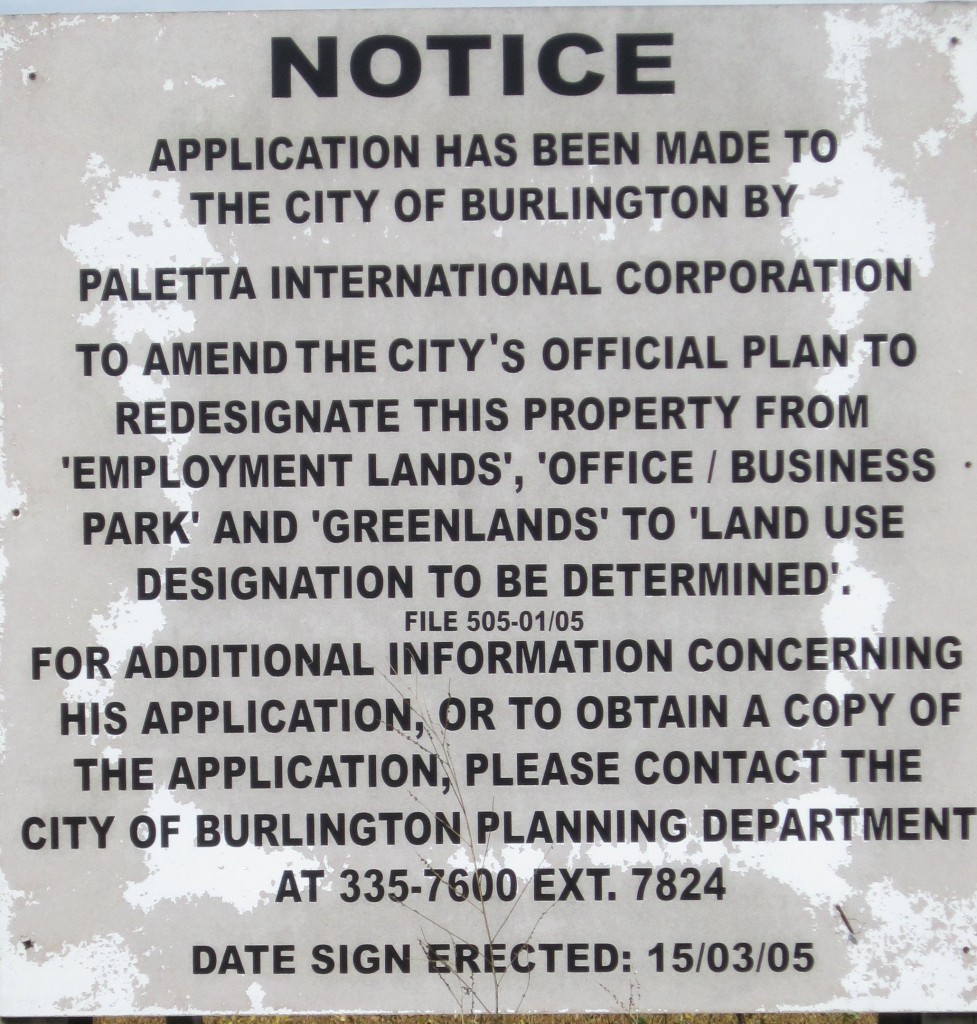
This sign tells the sad story of Burlington’s commercial development problems. Developers want to take land out of commercial zoning and move it into residential. They fight like crazy to get the zoning changed – all the way to the Ontario Municipal Board – where they all too frequently win.
Why are we not creating new jobs in the city? Because corporations and organizations that employ people are not opening offices in Burlington. Why is no one opening up new offices in Burlington? Because no one is building new office space. Why are new offices not being built? Do we not have the land to build offices on? The city has plenty of land that is zoned commercial/industrial but the owners of those properties do not want to build office buildings – they want to build residential housing because there is much more money on residential.
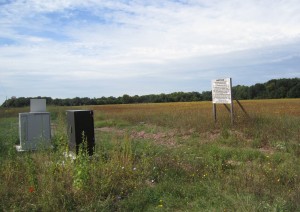
Zoned commercial, spitting distance to the QEW, minutes from downtown – owner wants to rezone and make it residential.
But residential housing costs the city more to service than that city has been able to collect in taxes.
This is pretty close to one of those Catch 22 situations – where the city does not appear to be able to win.
It gets worse. The age of a building determines to some degree the assessment rating applied to the property. About 2% of the housing stock was built before 1946; 26% was built between 1946 and 1969; 22% was built between 1970 and 1979. Between 1980 and 1989 20% of the residential housing we have was built, with 12% of what we now have built between 1990 and 1999. The figure for 2000 to 2005 was also 12% with 6% built between 2006 and 2011.
That’s a lot of numbers but the net result is that the city has a lot of housing, and infrastructure that goes with it, that is going to need to be replaced at a time when the amount of money coming into the city is lessening. That’s a problem that needs a solution.
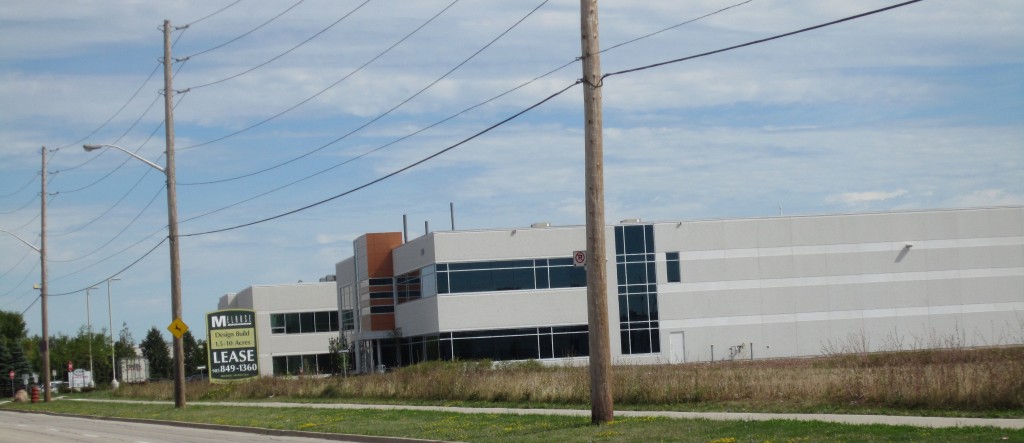
Developers don’t want to put up this kind of building – not enough money it. Tye city loves properties like these – they create jobs, keep people in the city and they are less expensive than residential properties to service. Our problems resolving this problem with the developers as us stymied – and in the process of going broke as well.
It is just as bad on the commercial/industrial side. At present about 41% of the ICI buildings were put up before 1980. Older buildings have a lower assessment value and that assessment translates into the amount of tax revenue the city receives. Put in different language – the city’s best tax payers are getting older and they aren’t paying as much as they used to in taxes – but the city needs that money now more than ever.
During a discussion with city manager Fielding and city treasurer Joan Ford, Fielding commented that the “platform is certainly not on fire” but these numbers are certainly red flags that we have to pay serious attention to.
Interestingly, Fielding made the comment about potential negative net ICI revenue on two occasions but I don’t recall any Council member picking up on it and asking for more information. The numbers part of the city’s business is not a strong point for either Councillors Meed Ward or Lancaster but Sharman, who would have you believe he is the smartest guy sitting around the horseshoe, and Dennison who will remind you frequently that he has an MBA, have yet to mutter a word. Something is amiss.
This year we saw the Alton Village complex go up – that will add to the assessment base won’t it? Nope; schools, public property and churches do not pay property taxes – so while the project was massive – it does nothing to the city’s revenue position.
And the housing in those communities is costing us more than it is paying us.
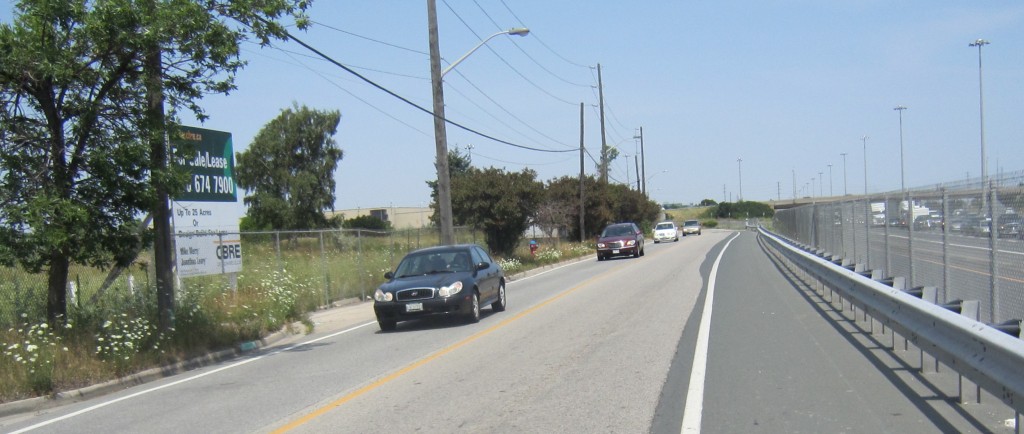
The city has been managing the IKEA file for some time now – they recently passed a new by-law relating to the property and repealed one that had passed previously. This photo shows the size of the problems – North Service Road as it is cannot handle the traffic IKEA will draw, nor can the Walkers Line intersection. Mammoth problems to resolve – will IKEA decide they can’t make a move work to the North Service Road and take a walk? It’s a question they have to be asking themselves.
The city manager was right to issue a note of caution. He may need a megaphone to get his words into the ears of the seven people who serve as your council. Is this an election issue?
And – what is the city doing to get things actually moving on the economic development side? And – is there a chance that IKEA will decide things are just not going to work for them on the North Service Road and take a walk?














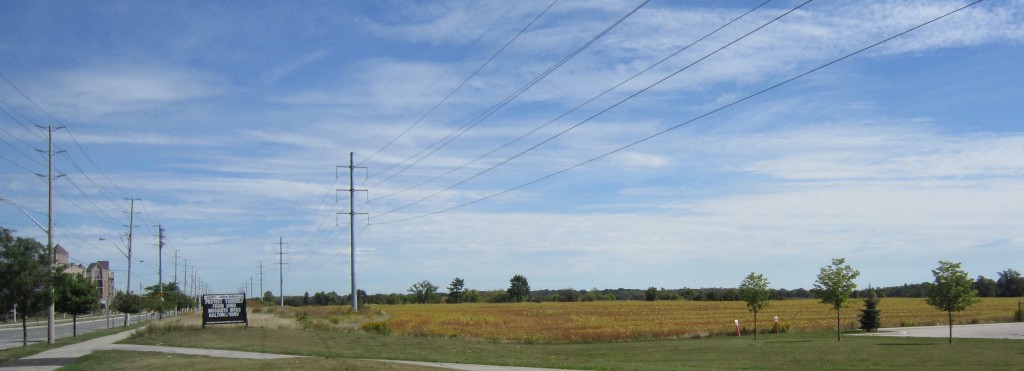


Evidence of Residential Property Tax Fatigue
https://www.burlingtongazette.ca/wp-content/uploads/2013/03/Historical-tax-increases-2000-20132-1024×564.png
Remember; “there’s only one taxpayer.”
Lots of factual mistakes in this article. But instead of pointing them out I want to make a new point which is to say that to be more attractive to businesses the city could lower the corporate tax rates.
You haven’t really made that simple point.
Editor’s note: DO point out the errors. Burlington has an exceptionally competitive commercial tax rate.